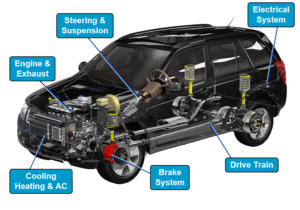- Schedule Your Appointment Now
- (602) 461-7172
Car Maintenance – 30-60-90k and When You Get Your Oil Changed
Why Use ASE Certified Auto Repair Technicians Like Mike’s Tech?
January 18, 2017Regular maintenance is the key to keep your car running smoothly. We recommend following a maintenance routine to prevent issues, repairs, and replacements as much as possible. A good maintenance routine will also ensure your car’s longevity, drivability, and safety.

With car batteries, you may need the help of an auto mechanic from time to time, but there are some simple things you can do yourself to maintain your car batteries. For instance, you can use a wire brush and a paste mix of baking soda and distilled water to clean the battery terminals. This should be done every 6 to 8 months. You can also coat your battery with multi-purpose grease (one that can withstand high temperatures) to prevent it from getting rusty and corroded. Most importantly, you should get your battery inspected every 3,000 miles or so.
The car’s fluids— the fuel, engine oil, coolants, and more, are also vital to keeping your car up and running.
For instance, the engine oil’s job is to clean, lubricate, and control the engine’s temperature. You can check if there’s too little or too much oil in your engine with the help of the dipstick. Checking regularly will help prevent leaks and engine damage. You should also replace the oil every 3,000 to 6,000 miles (or when the user’s manual recommends it).
The next thing to check is the coolant, which consists of a mixture of antifreeze and water. It is one of the most important fluids in your car as it prevents your engine from overheating, and should be replaced every 2-3 years. You should check the coolant levels every two weeks or before a long trip. If you find yourself refilling the coolants quite frequently, consult an auto mechanic as there may be a leak in the coolant system.
For example, Hyundai says the coolant (what many refer to as “antifreeze”) in most of its models should be replaced after the first 60,000 miles, then every 30,000 miles after that. The interval is every 30,000 miles on some Mercedes-Benz models, but on others it’s 120,000 miles or 12 years. On still other Mercedes, it’s 150,000 miles or 15 years.
Some manufacturers recommend changing the coolant more often on vehicles subjected to “severe service,” such as frequent towing. The schedule for many Chevrolets, though, is to change it at 150,000 miles regardless of how the vehicle is driven.
Read more at https://www.cars.com/articles/how-often-should-i-change-engine-coolant-1420680853669/#f5l1EP7vbRoAVKaG.99
Another thing to check and refill is the brake fluid. Without these, your brakes won’t function. First, locate where the brake fluid is with the help of the user’s manual. If it’s below or at the minimum level as indicated, add brake fluid up until the maximum level. As for the brakes, they should be inspected at least once a year. If they are starting to make squeaking or screeching sounds, it may be a sign that you need to change them. Check out our brake repair service we provide.
Next is the transmission fluid, which helps the gears turn smoothly. This fluid should be checked monthly— if it’s brown and smells burnt, it needs to be replaced already. Keep in mind also that it should never be at the minimum level, as this will cause issues with the gears.
Lastly, to keep your steering smooth, check your power steering fluid from time to time. If your car is running low on power steering fluid, you should hear a creaking noise from the steering wheel. All you need to do to check it is to look at the reservoir in the hood. Add power steering fluid as needed. In some cases you may need power steering repair or service, we can help you with that.
Most importantly, you should get tune-ups and check-ups for your car regularly. At Mikes Tech Transmission, we check for any problems with your car and ensure that it’s working in top condition, so come check us out!

